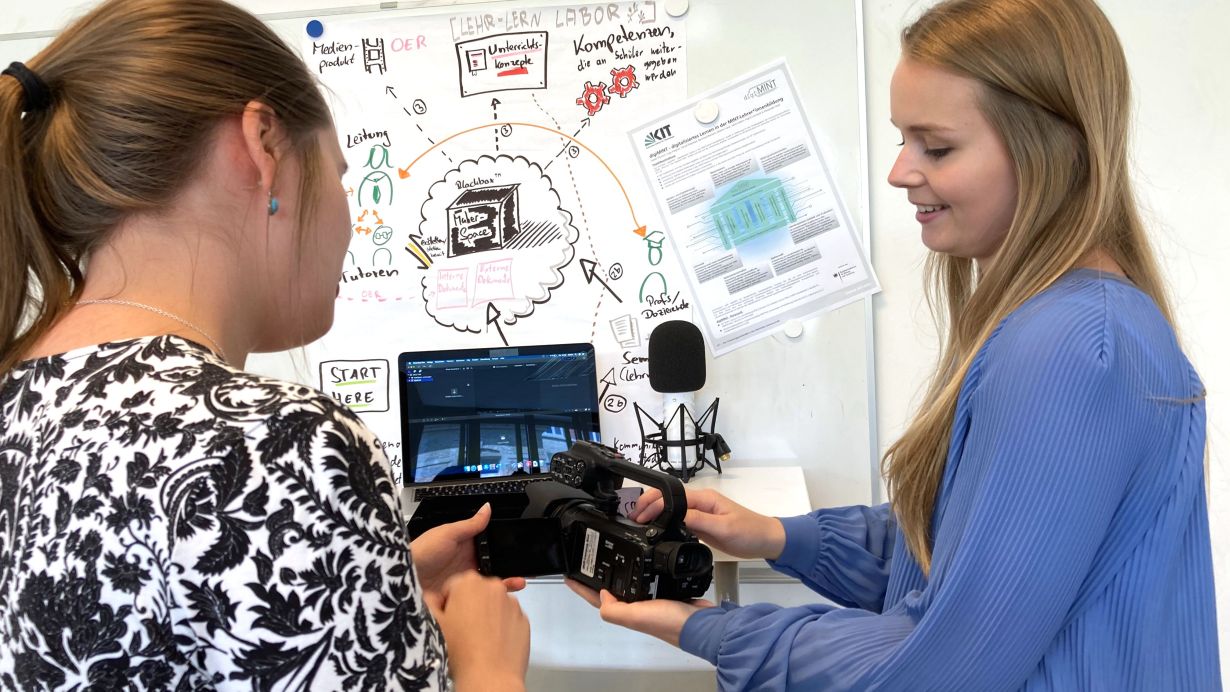
360° sports videos, mathematical escape games, or teaching-learning videos on biomechanics: Within the framework of the digiMINT project, teacher degree students of Karlsruhe Institute of Technology (KIT) worked on the digitalization of the education of future teachers in STEM subjects and tested a large range of options. Thanks to the new Digital Learning Lab and increased collaboration with external partners, KIT's teacher degree students will be able to test and integrate digital tools in future studies.
"Of course, we are living in the digital era. Still, digitalization of education is no end in itself, " says the Head of the digiMINT project, Professor Alexander Woll from the Institute of Sports and Sports Science. The Scientific Director of the Center for the Education of Teachers (ZLB) at KIT adds: "Good, digitally supported school education uses the new tools to improve learning and explaining and opens up entirely new opportunities. It is more than just a smart board instead of a black board in the classroom." Woll thinks that teacher degree students have to be able to use tablets, cameras, and apps in practice, to support pupils in conducting internet searches, and to reflect and reassess the use of digital tools.
digiMINT: Digitalization of Teacher Degree Programs Is Progressing
According to Dr. Tobias Wunsch, Managing Director of ZLB, development of these digital skills has hardly been part of teacher degree studies so far. With digiMINT, KIT made a big step forward in digitalization of teacher degree studies: "We are proud of digital tools in the classroom being part of the studies now and of having implemented many new ideas in practice as a result of digiMINT." From 2020 to 2023, digiMINT was funded by the Federal Ministry of Education and Research under the federal and state program of "Quality Campaign for Teacher Education." It focused on the subjects of mathematics, informatics, and education science. The digiLAB project funded by the Baden-Württemberg Ministry of Science, Research, and the Arts extended digiMINT to also cover the subjects of sports and engineering, sports and health, and natural science and engineering. KIT also cooperated with a number of partners in Baden-Württemberg.
Every Digital Tool Has Advantages and Drawbacks
About 170 teacher degree students took part in digiMINT. They learned how to produce 360° videos, to program an escape room game with simple modules, and to create teaching-learning videos for explaining contents. Based on this toolbox, they planned lesson units for other students or classes. The advantages and drawbacks of each tool were discussed critically. "This was the perfect combination of theory and practice. And it was a low-threshold course. For my studies, it is indispensable," says the future teacher of geography and natural science and engineering André Kurzeja. Laura Jänner, who studies to become a teacher of German and ethics, considers it important to familiarize with these options during studies: "There are many digital offers for schools. But they are used rarely, because teachers are working to capacity and do not have any time to inform themselves and to adapt their lessons to the new digital options."
Tested and Evaluated Contents of the Digital Learning Lab
Tobias Wunsch points out that the about 70 lesson concepts and seminars developed by the students have been tested and evaluated well. In this respect, they differ from many learning videos on platforms like YouTube. Depending on the subject, the materials can be accessed on different platforms, such as the KITopen media portal or the websites of the CAMMP (Computational and Mathematical Modeling Program) project. The contents were generated at the new Digital Learning Lab (DLL) of KIT among others. It offers both a real and a virtual learning environment, in which students can test the applications of various technologies. Upon the completion of digiMINT, the DLL may be used by all interested students of KIT. In the long term, DLL is planned to be opened to external partners as well. To continue digiMINT in daily business, ZLB plans to introduce a "digitalization certificate". "This would add to the Germany-wide recognition of teacher education at KIT," Wunsch says.
In the digiMINT project, the team of KIT cooperated with the Seminar for the Education and Training of Teachers (Secondary School) in Karlsruhe, the Baden-Württemberg Center for School Quality and Teacher Education, and the Karlsruhe Media Center. digiMINT started on March 1, 2020 and will end on December 31, 2023. It was funded by the Federal Ministry of Education and Research with about EUR 1.7 million.






